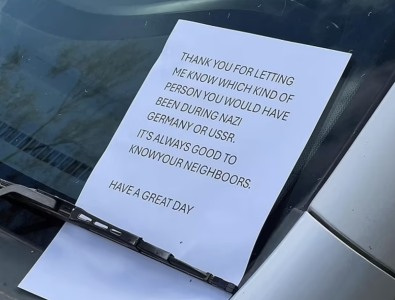Residents gasp over ‘horrendous’ message left on car’s windshield: ‘This is truly unhinged’
By
Seia Ibanez
- Replies 11
In the leafy, usually tranquil suburbs of Sydney's North Shore, residents are accustomed to the gentle rustle of eucalyptus leaves and the distant hum of the bustling city.
However, a recent event has shattered this serenity, leaving the community in a state of bewilderment and concern.
A dramatic and furious note left on a car windshield has sparked a flurry of speculation and debate among the locals.
The note, which was discovered tucked under a car's windshield wiper, read: 'Thank you for letting me know which kind of person you would have been during Nazi Germany or USSR. It's always good to know your neighboors (sic). Have a great day.'
The stark message, with its historical references and misspellings, has left many in the community stunned by the level of animosity it conveyed.
'This is truly unhinged,' commented one resident on social media, where the note was shared and quickly became the talk of the town.
'Wow, psychos everywhere,' wrote another, echoing the sentiment of disbelief.
'That's horrendous—it says more about the person who wrote the note than the owner of the car,' observed a third.
The reason behind the note's creation remains a mystery, with no clear indication of what could have prompted such a vitriolic outburst.
The community's online forum has been abuzz with theories and questions, with many residents calling for the note's author to 'chill out’.
'Someone will give themselves high blood pressure and eventually a heart episode,' one local cautioned.
Others in the community have questioned the appropriateness of the historical analogies used in the note.
The mention of Nazi Germany and the USSR in a neighbourhood dispute is a stark reminder of Godwin's law, which posited that as an online discussion grows longer, the probability of a comparison involving Nazis or Hitler approaches inevitability.
'What's the rule about losing an argument if you're first to mention Hitler or the Nazis?' a person inquired, referencing the well-known internet adage.
Some residents couldn't help but critique the author's spelling and grammar.
'What kind of person makes an effort to print out long notes written in capitals but does not correct the spelling of “neighboors,”’ one person pointed out.
While another added, 'I don't want to jump to conclusions...but it seems someone can't spell and has poor grammar skills.'
Curiosity about what could have led to such a dramatic note is rampant. 'What did you do?' one asked.
In a similar story, a driver sparked a heated debate online after receiving a ‘polite notice’ from a neighbour asking not to park outside their house for extended periods.
Social media users were divided, with some supporting the request as common courtesy and others deeming the note passive-aggressive and entitled. You can read more about the story here.

Have you ever received an anonymous note that left you puzzled or concerned? How did you handle the situation? Share them with us in the comments below!
However, a recent event has shattered this serenity, leaving the community in a state of bewilderment and concern.
A dramatic and furious note left on a car windshield has sparked a flurry of speculation and debate among the locals.
The note, which was discovered tucked under a car's windshield wiper, read: 'Thank you for letting me know which kind of person you would have been during Nazi Germany or USSR. It's always good to know your neighboors (sic). Have a great day.'
The stark message, with its historical references and misspellings, has left many in the community stunned by the level of animosity it conveyed.
'This is truly unhinged,' commented one resident on social media, where the note was shared and quickly became the talk of the town.
'Wow, psychos everywhere,' wrote another, echoing the sentiment of disbelief.
'That's horrendous—it says more about the person who wrote the note than the owner of the car,' observed a third.
The reason behind the note's creation remains a mystery, with no clear indication of what could have prompted such a vitriolic outburst.
The community's online forum has been abuzz with theories and questions, with many residents calling for the note's author to 'chill out’.
'Someone will give themselves high blood pressure and eventually a heart episode,' one local cautioned.
Others in the community have questioned the appropriateness of the historical analogies used in the note.
The mention of Nazi Germany and the USSR in a neighbourhood dispute is a stark reminder of Godwin's law, which posited that as an online discussion grows longer, the probability of a comparison involving Nazis or Hitler approaches inevitability.
'What's the rule about losing an argument if you're first to mention Hitler or the Nazis?' a person inquired, referencing the well-known internet adage.
Some residents couldn't help but critique the author's spelling and grammar.
'What kind of person makes an effort to print out long notes written in capitals but does not correct the spelling of “neighboors,”’ one person pointed out.
While another added, 'I don't want to jump to conclusions...but it seems someone can't spell and has poor grammar skills.'
Curiosity about what could have led to such a dramatic note is rampant. 'What did you do?' one asked.
In a similar story, a driver sparked a heated debate online after receiving a ‘polite notice’ from a neighbour asking not to park outside their house for extended periods.
Social media users were divided, with some supporting the request as common courtesy and others deeming the note passive-aggressive and entitled. You can read more about the story here.
Key Takeaways
- Residents of Sydney's north shore were left baffled by a dramatic note left on a car windshield that made extreme historical comparisons.
- The note, accusing the car owner of being the type of person who would align with oppressive regimes, was found by members of a community Facebook group.
- The inflammatory note caused alarm and concerned discussion within the community, with many condemning the vitriol and calling for calm.
- The author of the note was criticised for their hyperbole, spelling, and grammatical errors, while the reason behind the note's delivery has remained a mystery.








